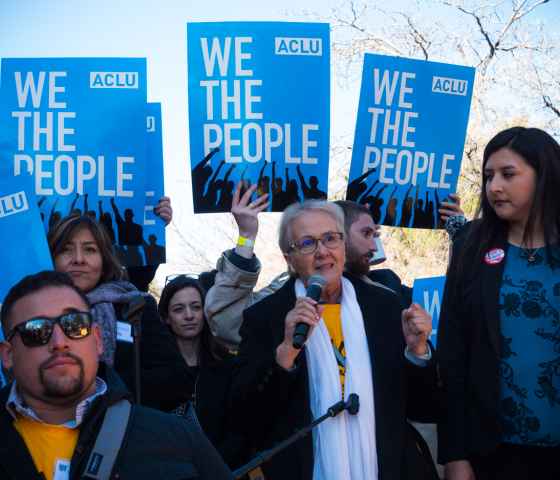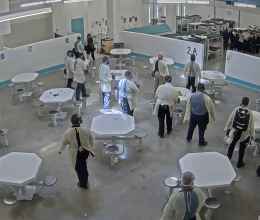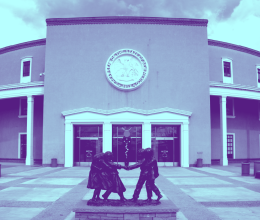People at the detention center have spent months dealing with raw sewage backed up in their living spaces, moldy showers and dangerously low staffing levels.
“I just don’t see how this place is still open, the way that it is,” a person held at the Torrance County Detention Facility (TCDF), who asked his name not be published for fear of retaliation, said in reflecting on what he’d endured there.
Conditions are so bad that a government watchdog issued a rare management alert in mid-March calling on U.S. Immigration and Customs Enforcement (ICE) to immediately remove all people detained in TCDF. Despite that urgent alert – echoed by New Mexico’s senators and Torrance County’s congresswoman – ICE recently quietly transferred 111 new people into the facility, according to the news organization SourceNM.
In response to the new transfers and ongoing efforts by ICE and CoreCivic to cover up what’s happening at TCDF, advocacy organizations last week submitted public records requests seeking records related to the conditions, operation and inspections of the facility. The requests were filed on behalf of Innovation Law Lab by the American Civil Liberties Union (ACLU) of New Mexico under the federal Freedom of Information Act and New Mexico’s Inspection of Public Records Act.
The Torrance detention center in Estancia, about an hour southeast of Albuquerque, is owned and operated by the private, for-profit prison company CoreCivic. It detains people on behalf of Torrance County, the U.S. Marshals Service and ICE.
Innovation Law Lab Co-Director of Anticarceral Legal Organizing Ian Philabaum called the information requested “a matter of life or death.”
"The horrors described in TCDF by the government’s own internal oversight agency pale in comparison to what the people held there describe to us. In fact, we know from experience and from careful analysis that the entire DHS oversight system is fundamentally performative and exists only to create the illusion of accountability,” Philabaum said. “The only way to find out what is really going on in Torrance is to demand full transparency, which is what these records requests are about."
The management alert issued by the Department of Homeland Security’s Office of Inspector General (OIG) on March 16 was only the latest sign of worsening conditions and abuse at TCDF. That includes a 2020 chemical attack against detained people engaged in a peaceful hunger strike over the facility’s inadequate COVID-19 protocols.
In November 2021, immigrant rights advocates and organizations, including the ACLU of New Mexico, delivered a letter to ICE demanding the agency provide access to legal services to an estimated 45 Haitian migrants that were being detained at TCDF. It turned out there were 73 Haitian migrants detained at Torrance, but with the assistance of advocates, they were all freed over the course of the next few months.
In July 2021, the facility failed a notoriously lax internal ICE inspection from The Nakamoto Group. Inspectors cited severe understaffing, unsanitary food and inadequate visitation rules among the deficiencies. They noted TCDF only had half the authorized security staff and employees were working mandatory overtime to try to make up the shortfall.
Then, on March 31, ICE published the results of a new Nakamoto Group inspection, which found the facility met standards despite stating that ongoing staff vacancies remain a serious issue.
“The most recent Nakamoto Group inspection is a blatant effort to whitewash conditions at the facility, but we know from ongoing conversations with people inside that problems like broken plumbing, lack of access to safe drinking water and critical understaffing remain,” said ACLU of New Mexico Senior Staff Attorney Rebecca Sheff. “That is why we’ve had to turn to public records requests to urgently shed light on this dangerous situation.”
Many people in ICE custody at Torrance fear speaking out about conditions due to the risk of retaliation – a reasonable fear given CoreCivic’s chemical attacks in response to prior calls for safer conditions. Innovation Law Lab and other legal service providers continue, however, to document serious health and safety issues at the facility. Even in medical emergencies, people are told to submit a request for “sick call” and routinely must wait 24 hours or more to see a medical provider.
The lack of safe drinking water has caused health issues for numerous people there. Many others have reported stomach aches and digestive problems from the food, which is often undercooked and sometimes even expired. People in ICE custody view the facility’s degrading conditions as a form of punishment for their decision to seek asylum in the U.S.
Jorge Zubiate-Rascon has been detained at Torrance by the Marshals Service since July 2021. The facility, he said, has been horrible the whole time he’s been there. The toilet in his cell doesn’t work, he said, and every time the person held in the cell above his flushes the toilet, the excrement flows down into Zubiate-Rascon’s own toilet. The whole cell stinks.
“There are a lot of things here that are wrong,” he said. “I wish someone would come here to see the conditions.”
According to Zubiate-Rascon, the floor was damaged in part of the facility’s kitchen – which is run by people detained at Torrance in both ICE and Marshals custody. Staff painted over the damaged section but seemingly did not use the appropriate paint and he has seen multiple people slip and fall as a result, he added.
“If I, who isn’t an inspector, can see that these things are bad,” Zubiate-Rascon said, “how can they say that it’s fine?”






